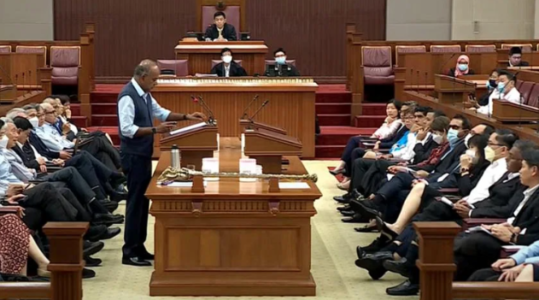Parliament passes significant reforms with overwhelming support amidst discussions on family values and social inclusion.
SINGAPORE: In a landmark decision, Singapore’s Parliament has voted to decriminalize gay sex and protect the definition of marriage against potential legal challenges, following the approval of two pivotal Bills on Tuesday (Nov 29). The repeal of Section 377A, a colonial-era law, was passed with a significant majority of 93 to three votes.
During the two-day debate, Members of Parliament (MPs) from the Workers’ Party (WP)—including Dennis Tan (WP-Hougang) and Gerald Giam (WP-Aljunied)—along with Nominated Member of Parliament (NMP) Hoon Hian Teck, voiced their opposition to the repeal. All MPs from the ruling People’s Action Party (PAP) supported the Bills, maintaining party discipline by not lifting the whip, which required members to vote in line with the party’s position.
Additionally, a constitutional amendment aimed at protecting the traditional definition of marriage was passed with an overwhelming majority of 85 to two votes. Two WP MPs, Sylvia Lim (WP-Aljunied) and He Ting Ru (WP-Sengkang), abstained from voting. Non-Constituency MP (NCMP) Hazel Poa stated her opposition to the amendment, arguing that the definition of marriage should be determined through a national referendum.
Concerns Over Traditional Family Values
Throughout the debate, nearly 40 MPs expressed their views, raising concerns about the preservation of traditional family structures and values. While some advocated for the protection of conventional marriage, others emphasized the need for inclusivity and non-discrimination against individuals outside of the traditional family unit, including singles, divorced individuals, and the LGBTQ+ community.
In his closing remarks, Law and Home Affairs Minister K Shanmugam reiterated the government’s commitment to uphold the heterosexual definition of marriage as a fundamental societal institution. He criticized the WP for lacking a clear stance and dismissed their claims about the party whip, asserting that MPs are always free to express their views, irrespective of party lines.
Shanmugam also mentioned that he has instructed his ministry to explore how to address the records of individuals convicted for consensual homosexual acts between 1988 and 2007. However, he clarified that there are no plans to allow individuals to change their registered sex on official documents.
Right to Religious Freedom
Social and Family Development Minister Masagos Zulkifli addressed concerns regarding religious freedoms during the debate, emphasizing that the government has no intentions of altering the definition of marriage to include same-sex unions. He affirmed that religious leaders and licensed solemnizers are prohibited from officiating same-sex marriages.
Masagos highlighted that while individuals are free to express their religious beliefs, there must be respect for others in a diverse society. He stated, “Gay people are members of our society and have access to the same opportunities and social support as other Singaporeans.”
In terms of education, he reaffirmed that Singapore’s policies and curricula will remain anchored in prevailing family values, emphasizing marriage between a man and a woman as the foundation of the social fabric.
In conclusion, Masagos expressed that the debates in Parliament demonstrated the importance of discussing complex social issues within a political framework rather than through legal means. He stated, “This is the strength of our system in Singapore when each branch – the legislature, executive and judiciary – does its part to its fullest and does what is right for Singapore and Singaporeans.”








